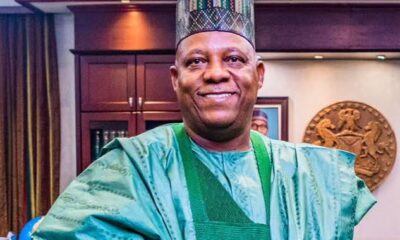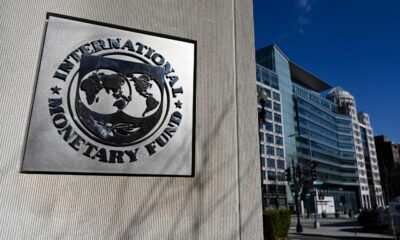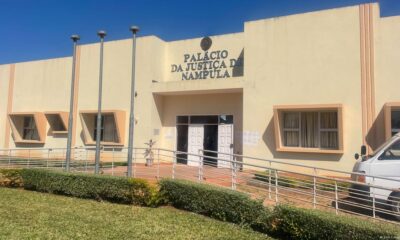Strictly Personal
Now that insecurity has ‘ended’ by Sonala Olumhense
Published
2 years agoon

Happy New Year, Nigeria! According to the calendar of the Federal Government, insecurity is now ‘over.’
Following seven years’ worth of the President, Major General Muhammadu Buhari’s (retd) meetings with security chiefs, various and persistent directives and orders, repeated budgetary provisions and outlays, declarations of intent and ambition, speeches at home and abroad, expensive orders of sophisticated military equipment, one of which led to an unresolved political blowout in July 2019 over the government’s spending of $1bn from the Excess Crude Account, insecurity in Nigeria slammed to a halt at midnight last night, December 31, 2022.
It is a new day and a new year! Mr Buhari has done exactly as he promised as he ran for office in 2015, reiterated on a “Next Level” basis in 2019, and routinely assured Nigerians whenever a microphone was placed in front of him: he has ended the plague of insecurity.
For anyone who has great faith in the word of the government, this first day of 2023 is surely one to celebrate. Remember, only as recently as October 2022, Rauf Aregbesola, who is Buhari’s Minister of the Interior, reminded Nigerians that the insecurity nationwide would end in December.
According to the Minister, Mr. Buhari himself had given his security agencies yesterday’s deadline. “I believe that nobody is resting in [any of] the arms of government with the mandate of maintaining law and order, guaranteeing security and eliminating threats,” Mr Aregbesola stressed. “We are at it, and in the first instance, we must ask ourselves, governance is about ensuring the security of lives and properties. We will eliminate all insecurity issues by December…Nigerians will definitely heave a sigh of relief at the end of the day.”
It has been quite some time getting here. Earlier, during his Democracy Day Speech in June 2021, Mr Buhari recalled his pre-election commitment, just as he had done dozens of times before.
“When you elected me as your President in 2015, you did so knowing that I will put an end to the growing insecurity, especially the insurgency in the North-East, but the unintended consequences of our scattering them in the North-East pushed them further in-country which is what we are now facing and dealing with.
“We will, by the Grace of God put an end to these challenges too. Unfortunately, like in most conflict situations, some Nigerian criminals are taking undue advantage of a difficult situation and profiteering therefrom with the misguided belief that adherence to the democratic norms handicaps this administration from frontally and decisively tackling them. We are already addressing these obstacles and we will soon bring some of these culprits to justice.”
And then one month later, Mr. Buhari again restated his pledge when he held a presidential dinner for members of the National Assembly in Abuja. He told them that his administration would use everything within its powers to end insecurity in the country and bring the criminals responsible to justice.
And so, with December 2022 now accomplished, Nigerians must jubilate that Mr. Buhari’s pledge about insecurity also has. As of last night, Nigeria is now a secure country.
This means that no longer are members of ISWAP and Boko Haram controlling an inch of Nigerian territory. No longer is banditry the nation’s most prominent industry. No longer are parents afraid that their children may be snatched from classrooms to be forced into marriage or converted into soldiers.
This means that no longer are there AK47-wielding cattle herdsmen overrunning farms and towns and villages. No longer are Nigerians afraid of sundry criminals emerging from badly-maintained highways to make their choice of travellers for kidnapping-for-ransom or the harvesting of body parts.
This means that no longer will intercity train services be sacked by criminals who are better-armed and more intelligent than members of Nigeria’s security services. Train services will no longer be requiring the protection of the Nigeria Air Force or expensive private security.
It further means that no longer are security institutions such as Kuje Prison and the Nigeria Defence Academy and police stations and airports in any danger of being taken by armed bandits at will. It means that no longer will Buhari’s armed presidential convoys require the protection of armed presidential convoys or the Nigeria Air Force.
It means that Nigerian businesses and offices are no longer in danger of being ransacked by unknown gunmen taking advantage of the indifference of indifferent governments which look the other way when citizens need them the most. It means that citizens can now walk the streets, unafraid either of other men who attack simply because they can, or of policemen in uniforms who shoot and kill citizens because the citizens are unarmed.
This means that as decreed and declared by Mr Buhari, the era of insecurity that came into operation during the reign of his predecessors is over. Nigerians can now emerge from the shadows and from hiding and resume their lives.
It means that neither Mr Buhari nor his security chiefs nor the state governors will ever again be bothered with questions about insecurity, such as why they themselves need extensive and heavily-armed convoys and road closures just to get to the airport or to return home. It means that even the wife of the president will find her heavily-fortified official home to be secure enough for her to live in, rather than another country.
But of course, everyone knows that nothing is often what it seems in Nigeria, particularly when the motivation is an official pronouncement. Nigeria did not become secure as of last midnight, just as it never became more secure in the past seven and a half years because Mr. Buhari broadcast his directives into every television camera.
Buhari did not start the insecurity in Nigeria, but he acquired the presidency partly by bragging that he was the man to end it. Instead, he has boosted it year by year because he neither really understood the challenge nor was he willing to do what was required to bring it under control.
Prominent among those problems is that the Nigerian leader arrived in office lacking genuine commitment and for the insecurity and any other challenge that Nigeria faced. It is why there is no aspect of his brief in which he accomplished anything beyond platitudes.
Sadly, Nigeria is increasingly insecure because of—rather than despite—Mr. Buhari. Despite his government’s claims, Nigeria is worse than before his arrival, and the entire world knows it: it is more chaotic, more dysfunctional, and exceedingly more corrupt. That is one explanation why some of Nigeria’s most infernal creatures are currently trying to succeed him next May.
That is why, as we enter January 2023, and with less than five months before Mr. Buhari leaves office, is for him to be apologising profusely for the cynicism and betrayal of the outgoing menace he superintends.
Happy New Year, Nigeria? Please!
You may like
-


Niger citizen knocks President Tchiani for neglecting critical issues at home to peddle rumours against Nigeria
-


Dumping England for Nigeria the best decision of my life— Ademola Lookman
-


Nigeria resumes mining in Zamfara state
-


Nigeria’s future is very bright, we’ll overcome challenges, VP Shettima says
-


‘Pray for leaders to serve you diligently,’ President Tinubu tells Nigerians
-


Nigeria on the right path despite hardship, criticism— President Tinubu
Strictly Personal
Let’s merge EAC and Igad, By Nuur Mohamud Sheekh
Published
1 month agoon
November 27, 2024
In an era of political and economic uncertainty, global crises and diminishing donor contributions, Africa’s regional economic communities (RECs) must reimagine their approach to regional integration.
The East African Community (EAC) and the Intergovernmental Authority on Development (Igad), two critical RECs in East Africa and the Horn of Africa have an unprecedented opportunity to join forces, leveraging their respective strengths to drive sustainable peace and development and advance regional economic integration and promote the African Continental Free Trade Area (AfCFTA).
Already, four of the eight Igad member states are also members of the EAC and, with Ethiopia and Sudan showing interest, the new unified bloc would be formidable.
Igad’s strength lies in regional peacemaking, preventive diplomacy, security, and resilience, especially in a region plagued by protracted conflicts, climate challenges, and humanitarian crises. The EAC, on the other hand, has made remarkable strides in economic integration, exemplified by its Customs Union, Common Market, and ongoing efforts toward a monetary union. Combining these comparative advantages would create a formidable entity capable of addressing complex challenges holistically.
Imagine a REC that pairs Igad’s conflict resolution strengths with the EAC’s diplomatic standing and robust economic framework. Member states of both are also contributing troops to peacekeeping missions. Such a fusion would streamline efforts to create a peaceful and economically prosperous region, addressing the root causes of instability while simultaneously promoting trade investment and regional cooperation.
These strengths will be harnessed to deal with inter-state tensions that we are currently witnessing, including between Ethiopia and Somalia over the Somaliland MoU, strained relations between Djibouti and Eritrea, and the continually deteriorating relations between Eritrea and Ethiopia.
The global economy experienced as a result of the COVID-19 pandemic, compounded by the Ukraine war and competing global crises, has strained donor countries and reduced financial contributions to multilateral organisations and African RECs. Member states, many of which are grappling with fiscal constraints, are increasingly unable to fill this gap, failing to make timely contributions, which is in turn affecting key mandate areas of Igad and EAC, and staff morale.
A merger between Igad and EAC would alleviate this financial pressure by eliminating redundancies. Shared administrative systems, integrated programmes, and a unified leadership structure would optimise resources, enabling the new REC to achieve more with less. Staff rationalisation, while sensitive, is a necessary step to ensure that limited funds are channelled toward impactful initiatives rather than duplicative overheads.
The African Union (AU) envisions a fully integrated Africa, with RECs serving as the building blocks of the AfCFTA. A unified EAC-Igad entity would become a powerhouse for regional integration, unlocking economies of scale and harmonising policies across a wider geographical and economic landscape.
This merger would enhance the implementation of the AfCFTA by creating a larger, more cohesive market that attracts investment, fosters innovation, and increases competitiveness. By aligning trade policies, infrastructure projects, and regulatory frameworks, the new REC could serve as a model for others, accelerating continental integration.
The road to integration is not without obstacles. Political will, divergent institutional mandates, and the complexity of harmonising systems pose significant challenges. However, these hurdles are surmountable through inclusive dialogue, strong leadership, and a phased approach to integration.
Member states must prioritise the long-term benefits of unity over short-term political considerations. Civil society, the private sector, the youth, and international partners also have a critical role to play in advocating for and supporting this transformative initiative.
The time for EAC and Igad to join forces is now. By merging into a single REC, they would pool their strengths, optimise resources, and position themselves as a driving force for regional and continental integration. In doing so, they would not only secure a prosperous future for their citizens and member states but also advance the broader vision of an integrated and thriving Africa.
As the world grapples with crises, Africa must look inward, embracing the power of unity to achieve its potential. A combined Igad-EAC is the bold step forward that the continent needs.
Nuur Mohamud Sheekh, a diplomatic and geopolitical analyst based in London, is a former spokesperson of the Igad Executive Secretary. X: @NuursViews
Strictly Personal
Budgets, budgeting and budget financing, By Sheriffdeen A. Tella, Ph.D.
Published
1 month agoon
November 20, 2024
The budget season is here again. It is an institutional and desirable annual ritual. Revenue collection and spending at the federal, State and local government levels must be authorised and guided by law. That is what budget is all about. A document containing the estimates of projected revenues from identified sources and the proposed expenditure for different sectors in the appropriate level of government. The last two weeks have seen the delivery of budget drafts to various Houses of Assembly and the promise that the federal government would present its draft budget to the National Assembly.
Do people still look forward to the budget presentation and the contents therein? I am not sure. Citizens have realised that these days, governments often spend money without reference to the approved budget. A governor can just wake up and direct that a police station be built in a location. With no allocation in the budget, the station will be completed in three months. The President can direct from his bathroom that 72 trailers of maize be distributed to the 36 states as palliatives. No budget provision, and no discussion by relevant committee or group.
We still operate with the military mentality. We operated too long under the military and of the five Presidents we have in this democracy, two of them were retired military Heads of State. Between them, they spent 16 years of 25 years of democratic governance. Hopefully, we are done with them physically but not mentally. Most present governors grew up largely under military regimes with the command system. That is why some see themselves as emperor and act accordingly. Their direct staff and commissioners are “Yes” men and women. There is need for disorientation.
The importance of budget in the art of governance cannot be overemphasized. It is one of the major functions of the legislature because without the consideration and authorisation of spending of funds by this arm of government, the executive has no power to start spending money. There is what we refer to as a budget cycle or stages. The budget drafting stage within the purview of the executive arm is the first stage and, followed by the authorisation stage where the legislature discusses, evaluates and tinkers with the draft for approval before presenting it to the President for his signature.
Thereafter, the budget enters the execution phase or cycle where programmes and projects are executed by the executive arm with the legislature carrying out oversight functions. Finally, we enter the auditing phase when the federal and State Auditors verify and report on the execution of the budgets. The report would normally be submitted to the Legislature. Many Auditor Generals have fallen victim at this stage for daring to query the executives on some aspects of the execution in their reports.
A new budget should contain the objectives and achievements of the preceding budget in the introduction as the foundation for the budget. More appropriately, a current budget derives its strength from a medium-term framework which also derives its strength from a national Development Plan or a State Plan. An approved National Plan does not exist currently, although the Plan launched by the Muhammadu Buhari administration is in the cooler. President Tinubu, who is acclaimed to be the architect of the Lagos State long-term Plan seems curiously, disillusioned with a national Plan.
Some States like Oyo and Kaduna, have long-term Plans that serve as the source of their annual budgets. Economists and policymakers see development plans as instruments of salvation for developing countries. Mike Obadan, the former Director General of the moribund Nigeria Centre for Economic and Management Administration, opined that a Plan in a developing country serves as an instrument to eradicate poverty, achieve high rates of economic growth and promote economic and social development.
The Nigerian development plans were on course until the adoption of the World Bank/IMF-inspired Structural Adjustment Programme in 1986 when the country and others that adopted the programme were forced to abandon such plan for short-term stabilisation policies in the name of a rolling plan. We have been rolling in the mud since that time. One is not surprised that the Tinubu administration is not looking at the Buhari Development Plan since the government is World Bank/IMF compliant. It was in the news last week that our President is an American asset and by extension, Nigeria’s policies must be defined by America which controls the Bretton Woods institutions.
A national Plan allows the citizens to monitor quantitatively, the projects and programmes being executed or to be executed by the government through the budgeting procedure. It is part of the definitive measures of transparency and accountability which most Nigerian governments do not cherish. So, you cannot pin your government down to anything.
Budgets these days hardly contain budget performance in terms of revenue, expenditure and other achievements like several schools, hospitals, small-scale enterprises, etc, that the government got involved in successfully and partially. These are the foundation for a new budget like items brought forward in accounting documents. The new budget should state the new reforms or transformations that would be taking place. Reforms like shifting from dominance of recurrent expenditure to capital expenditure; moving from the provision of basic needs programmes to industrialisation, and from reliance on foreign loans to dependence on domestic fund mobilisation for executing the budget.
That brings us to the issue of budget deficit and borrowing. When an economy is in recession, expansionary fiscal policy is recommended. That is, the government will need to spend more than it receives to pump prime the economy. If this is taken, Nigeria has always had a deficit budget, implying that we are always in economic recession. The fact is that even when we had a surplus in our balance of payment that made it possible to pay off our debts, we still had a deficit budget. We are so used to borrowing at the national level that stopping it will look like the collapse of the Nigerian state. The States have also followed the trend. Ordinarily, since States are largely dependent on the federal government for funds, they should promote balanced budget.
The States are like a schoolboy who depends on his parents for school fees and feeding allowance but goes about borrowing from classmates. Definitely, it is the parents that will surely pay the debt. The debt forgiveness mentality plays a major role in the process. Having enjoyed debt forgiveness in the past, the federal government is always in the credit market and does not caution the State governments in participating in the market. Our Presidents don’t feel ashamed when they are begging for debt forgiveness in international forum where issues on global development are being discussed. Not less than twice I have watched the countenance of some Presidents, even from Africa, while they looked at our president with disdain when issues of debt forgiveness for African countries was raised.
In most cases, the government, both at the federal and state cannot show the product of loans, except those lent by institutions like the World Bank or African Development Bank for specific projects which are monitored by the lending institutions. In other cases, the loans are stolen and transferred abroad while we are paying the loans. In some other cases, the loans are diverted to projects other than what the proposal stated. There was a case of loans obtained based on establishing an international car park in the border of the State but diverted to finance the election of a politician in the State. The politician eventually lost the election but the citizens of the State have to be taxed to pay the loan. Somebody as “Nigeria we hail thee”.
Transformation in budgeting should commence subsequently at the State and federal level. Now that local government will enjoy some financial autonomy and therefore budgeting process, they should be legally barred from contracting foreign loans. They have no business participating in the market. They should promote balanced budget where proposed expenditures must equal the expected revenues from federal and internal sources. The State government that cannot mobilise, from records, up to 40 percent of its total budget from IGR should not be supported to contract foreign loans. The States should engage in a balanced budget. The federal government budget should shift away from huge allocations to recurrent expenditure towards capital expenditure for capital formation and within the context of a welfarist state.
Sheriffdeen A. Tella, Ph.D.
EDITOR’S PICK


Niger citizen knocks President Tchiani for neglecting critical issues at home to peddle rumours against Nigeria
A citizen of Niger Republic has slammed the country’s military leader, President Abdourahmane Tchiani, for neglecting critical issues facing the...


Moroccan tourist arrivals hit record-breaking 16 million
The year 2024 has seen Morocco celebrate a record-breaking 16 million tourist arrivals, surpassing the 12 million mark set in...


Safaricom Ethiopia launches 4G network in Gambella
Ethiopia’s second largest telecom provider, Safaricom Telecommunications Ethiopia P.L.C., has announced the official launching of its 4G network services in...


Dumping England for Nigeria the best decision of my life— Ademola Lookman
Current African Men’s Footballer of the Year, Ademola Lookman, has attributed his rise in the football echelon to his decision...


Zambian NGOs rate President Hichilema’s reforms as not far-reaching
Two Non-Governmental Organizations (NGOs) in Zambia, the Transparency International-Zambia (TI-Z) and the Continental Leadership Research Institute (CLRI), have rated the...


IMF, Egypt reach agreement for fourth review of Egypt’s $1.2 billion loan request
Egypt and the International Monetary Fund (IMF) have reached a staff-level agreement over the fourth review of the Extended Fund...


Libya’s eastern govt accepts petrol subsidy elimination
In a recent statement, the eastern government of Libya claimed it had reached a consensus on a plan to eliminate...


World Bank suspends loan fees for impoverished countries
To lower borrowing costs for vulnerable nations, the World Bank has announced the elimination of several loan fees. The action...


Mozambique’s top court affirms governing party’s victory in recent election
The highest court in Mozambique affirmed Monday that the incumbent Frelimo party won the October election, sparking widespread demonstrations from...


Nigeria resumes mining in Zamfara state
According to the mining minister, Nigeria has removed a five-year restriction on mining exploration in the northwest state of Zamfara,...
Trending
-

 Politics2 days ago
Politics2 days agoMozambique’s top court affirms governing party’s victory in recent election
-

 VenturesNow2 days ago
VenturesNow2 days agoLibya’s eastern govt accepts petrol subsidy elimination
-

 VenturesNow2 days ago
VenturesNow2 days agoNigeria resumes mining in Zamfara state
-

 Metro2 days ago
Metro2 days agoZambian NGOs rate President Hichilema’s reforms as not far-reaching


